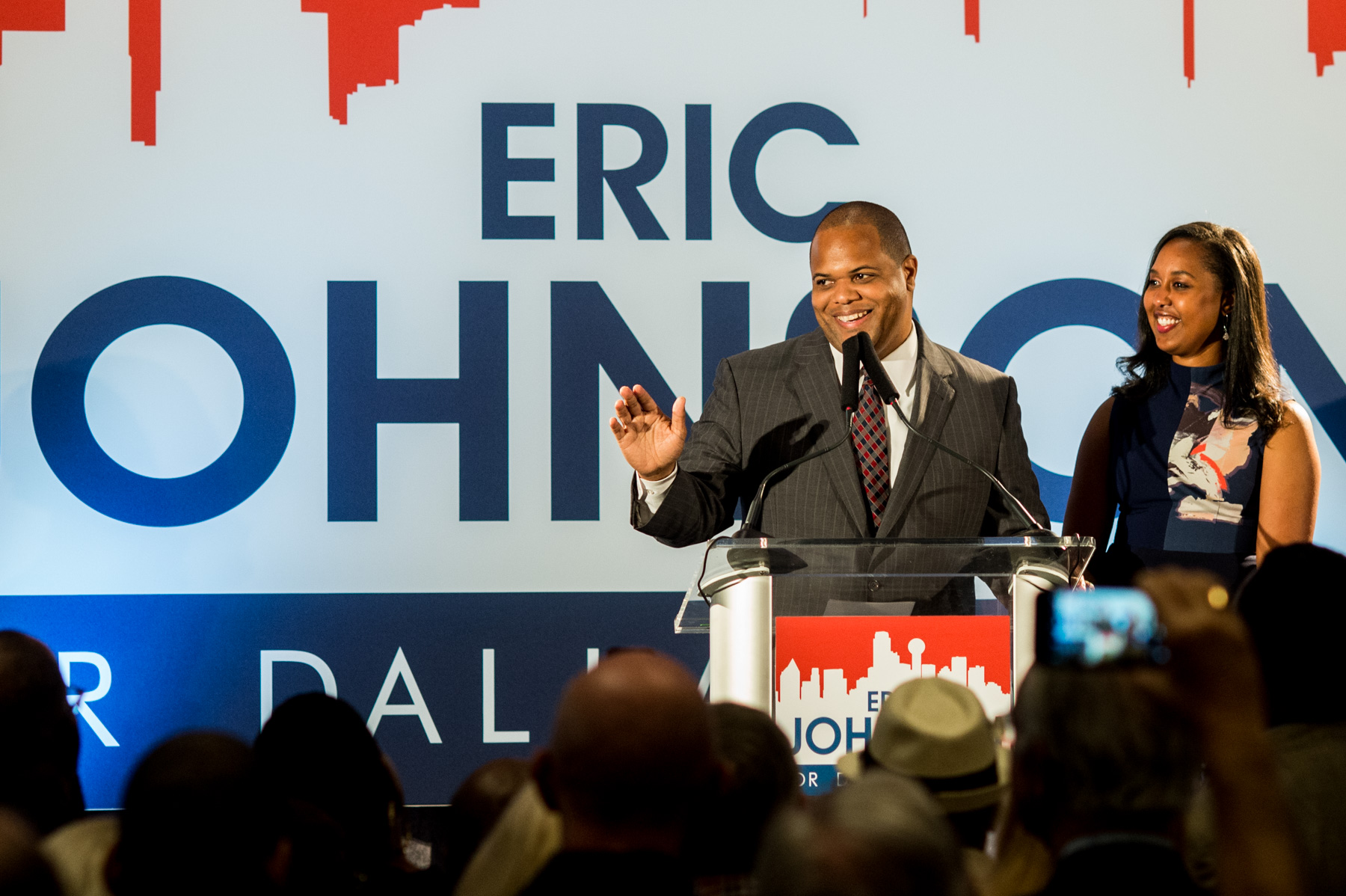Mayor Eric Johnson has officially switched parties. The former Democratic state representative writes in the Wall Street Journal that he has joined the GOP and will vote in the Republican primary next spring. “I realize this will come as a surprise to many,” he writes. But it really doesn’t.
The mayor has been walking along this path for some time. During the City Council inauguration in June, Republican U.S. Sen. John Cornyn swore in Johnson for his second term, while the rest of his colleagues took their oaths from a municipal judge. Texas’ Republican junior Sen. Ted Cruz watched from the seats in the Meyerson, an official guest of the mayor’s. Johnson refused to endorse a candidate in the 2020 presidential election, citing the technically nonpartisan position he occupies. “It’s important that we keep nonpartisan offices nonpartisan,” he told the Dallas Morning News in 2020, adding that he was “committed to not endorsing candidates in partisan races while serving as mayor.”
Jump-cut to today: “But I don’t believe I can stay on the sidelines any longer,” he writes in his WSJ op-ed. “I have always tried to be honest and say what I think is right for my city. The future of America’s great urban centers depends on the willingness of the nation’s mayors to champion law and order and practice fiscal conservatism.”
He has spent the last few months giving friendly interviews to Fox News and local conservative outlets like WBAP. And his opinion piece cites his belief in “fiscal conservatism” that guided his recent failed effort to lower the city’s tax rate, a key tenet of the Republican platform.
His push during the budget season 2020 was to “defund the bureaucracy,” directing the city manager to cut staff salaries. It failed. The Council instead sliced the line item for police overtime by $7 million, prompting the mayor to claim that his colleagues were “defunding” the police. The City Council generally works the margins of the police budget. This year, the department’s budget grew to $669 million, in line with annual increases since Johnson took office.
“I have no intention of changing my approach to my job,” he wrote in the WSJ. “But today I am changing my party affiliation.”
Dallas County votes blue. Biden carried the county with 65 percent of the vote in 2020, and MJ Hegar picked up 61 percent in her race against Cornyn. Hillary Clinton picked up 60 percent of the vote in 2016, and Beto O’Rourke pulled in 66 percent in 2018 when he challenged U.S. Sen. Ted Cruz.
Johnson won the runoff for Dallas mayor in 2019, when he was still serving in the Texas House as a Democrat. He courted the business community, pulling in maximum $5,000 donations from folks who are frequent contributors to Republican candidates: oilman Ray Hunt, telecom billionaire Kenny Troutt, investor Doug Deason, developer Ross Perot Jr., and former Rick Perry advisor George Seay, to name a few.
What does this change? Probably not much operationally, at least during his remaining time at City Hall.
Johnson has an icy relationship with many of his colleagues, and he hasn’t been able to build consensus around his policy priorities that requires a majority vote. He participated in a failed coup to fire City Manager T.C. Broadnax, and his efforts to endorse opponents to City Council incumbents in the 2021 race didn’t work, either. Most of his work has come outside of the horseshoe, creating volunteer task forces that make recommendations around parks, public safety, and workforce development.
He has seen progress there. Most recently, his parks initiative has coalesced public and private support in building new parks on empty city-owned land. Private nonprofits like the Trust for Public Land are leading ambitious plans to establish new trails and parks in Oak Cliff and the southern part of the city. The mayor again says that Dallas is the only large American city to reduce violent crime for two years in a row, a claim that is way more complicated than it sounds. But Johnson’s support of targeted infrastructure improvements and wraparound services—backed by data collected by the nonprofit Child Poverty Action Lab—appears to be showing positive results in small areas targeted by police enforcement.
Expect more of the same, according to his op-ed: difficulty around the horseshoe, with his priorities being pushed that are adjacent to the operations at City Hall.
But here is what to watch for. The one thing pulsing through Johnson’s four years in office is a simmering challenge to Dallas’ “weak mayor” system of government. Per the charter, the mayor of Dallas has the power of the bully pulpit, committee assignments, and their control of public meetings. The City Council sets policy, and the city manager runs the show. The mayor is one vote of 15.
Next year, the city charter is up for review. The mayor’s attempt to oust the city manager was a rolling boil from a long-standing feud between the two men. While the mayor holds just his vote, he appoints the chair of the commission that will review the charter. If Johnson wants to begin a push to advocate the city government change to a strong-mayor system—where the mayor has the power to set policy—this is when it would happen. However, changing party affiliation probably won’t go a long way toward building a consensus that he hasn’t been able to maintain.
It would likely not impact his time in office; most charter rewrites apply to the next mayor and Council, not those who are present. The City Council will review the amendments before presenting them to voters.
The other undercurrent of the mayor’s time in office has been whether his time at the top of 1500 Marilla will be a launching pad to higher office. “When my career in elected office ends in 2027 on the inauguration of my successor as mayor, I will leave office as a Republican,” he wrote in the WSJ. He will walk into a party currently undergoing a crisis in the wake of Attorney General Ken Paxton’s acquittal in his impeachment trial. (Paxton welcomed the mayor to the party on X/Twitter shortly after the op-ed was published.) Should he want another office, there will likely be a path.
But for now, he’s the 60th mayor of Dallas, who cruised to an unopposed victory for his second and final term, but is still inflating his reelection margin to 98.7 percent from the 93 percent he actually secured. (Out of the 650,607 registered voters in the city of Dallas, 6.6 percent voted for Johnson last year. Turnout was abysmal. In total, just below 9 percent of registered voters cast a ballot.)
And now his cards are on the table.
Author






